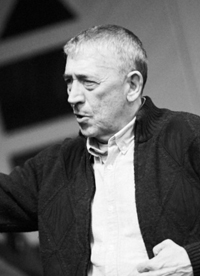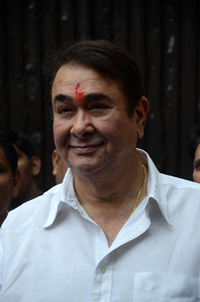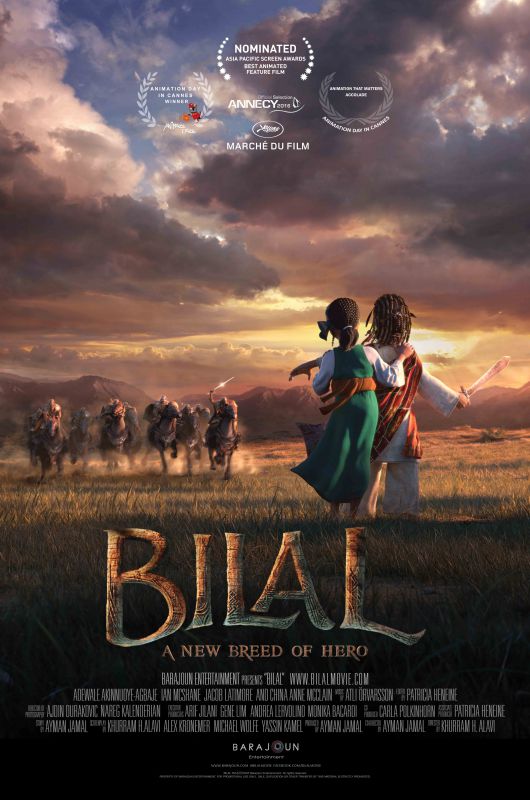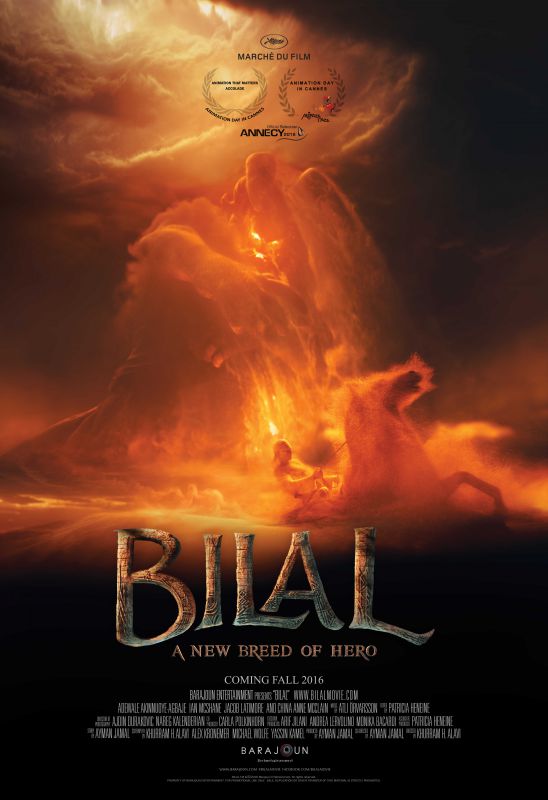|
|
||
|
Pro Tools
FILMFESTIVALS | 24/7 world wide coverageWelcome ! Enjoy the best of both worlds: Film & Festival News, exploring the best of the film festivals community. Launched in 1995, relentlessly connecting films to festivals, documenting and promoting festivals worldwide. Working on an upgrade soon. For collaboration, editorial contributions, or publicity, please send us an email here. User login |
Bilal selected to play at Moscow Film Festival, out of competitionJURY
IVAYLO HRISTOV
(December 10, 1955,Sofia, Bulgaria) Graduated from the department of acting at the National Academy for Theatre and Film Arts NATFIZ. Worked at the Sliven drama theatre “Stefan Kirov”. Since 1985 worked as an actor at the Theatre of Bulgarian Army in Sofia. He has more than 50 roles in theatre, and more than twenty in feature films to his credit, directed stage productions “Accidental Death of an Anarchist”, “Sex & Drugs & Rock & Roll”, “Graduate” etc. Since 1992 teaches acting at NATFIZ. His first feature “Emigrants” (2003), which he directed together with Lyudmil Todorov, won several national awards and participated in many film festivals. “Footsteps in the Sand” (2010) participated in the competition of the 32 MIFF. He is an author of the book - "The actor in cinema". One of the founders of the prestigious Bulgarian theatre awards, Askeer. Ivaylo Hristov’s last film “Loosers” is a winner of the 37 Moscow Film Festival.
ULRIKE OTTINGER
Ulrike Ottinger grew up in Konstanz, where she opened her own studio at an early age. From 1962 until 1968, she lived and worked as an artist in Paris, where she exhibited at the Salon de la Jeune Peinture and elsewhere. She studied etching techniques at the studio of Johnny Friedlaender and attended lectures at the Sorbonne on art history, religious studies, and ethnology with Claude Lévi-Strauss, Louis Althusser and Pierre Bourdieu. In 1966, she wrote her first screenplay, entitled “The Mongolian Double Drawer.” After returning to West Germany, she founded the “filmclub visuell” in Konstanz in 1969, as well as the “galeriepress” gallery and press, presenting Wolf Vostell and David Hockney, among others. With Tabea Blumenschein, she realized her first film in 1972-1973, LAOCOON & SONS, which had its premiere at Arsenal Berlin. She moved to Berlin in 1973, where she filmed the happening documentation BERLINFEVER – WOLF VOSTELL. After THE ENCHANTMENT OF THE BLUE SAILORS (1975), with Valeska Gert, came the female pirate film MADAME X (1977), a coproduction with the ZDF television network. The film was a sensation, and prompted substantial controversy. Her “Berlin trilogy” began with TICKET OF NO RETURN (1979), followed by FREAK ORLANDO (1981) and DORIAN GRAY IN THE MIRROR OF THE YELLOW PRESS (1984). Collaborating on the films were Delphine Seyrig, Magdalena Montezuma, Veruschka von Lehndorff, Eddie Constantine, and Kurt Raab, as well as the composer Peer Raben. In the short film USINIMAGE (1987), she revisited imagery derived from industrial wastelands and alienated urban landscapes. CHINA. THE ARTS – THE PEOPLE (1985) is the first in a series of long documentary films made in the course of Ulrike Ottinger’s travels through Asia. She made the narrative film JOHANNA D’ARC OF MONGOLIA in Mongolia in 1989, followed three years later by the eight-hour documentary film TAIGA. Alongside her journeys to the Far East, she applied a virtually “ethnographic” attention to the changes taking place in her own city between the fall of the Berlin Wall and German reunification in the documentary film COUNTDOWN. After the documentary film EXILE SHANGHAI (1997), her travels took her to southeast Europe, where she once again created a documentary film and a narrative film: SOUTHEAST PASSAGE (2002) and TWELVE CHAIRS (2004). The films of Ulrike Ottinger have received numerous awards, including the Audience Jury Prize in Montréal and the Bundesfilmpreis (Visual Design) for JOHANNA D’ARC OF MONGOLIA (1989), and the German Film Critics Award for the documentary films CHINA. THE ARTS – THE PEOPLE (1986) and PRATER (2008). Her works have been shown at the world’s most important film festivals and appreciated in multiple retrospectives, including at the Cinémathèque française in Paris and at the Museum of Modern Art in New York. Ulrike Ottinger has also worked as a director of theater and opera. Her productions have included the 2000 premiere of Elfriede Jelinek’s “The Farewell” at the Berliner Ensemble. Ulrike Ottinger has worked in photography throughout her career as an artist. With her photographs, created largely in parallel with the film works, she has identified her own visual points of emphasis. She has taken part in major art exhibitions, presenting works at the Biennale di Venezia, the Documenta, and the Berlin Biennale, among others. Her solo exhibitions have been, among other places, in Rotterdam, Madrid, Berlin, and New York. In 2011 she was awarded the Hannah-Höch-Prize for her creative work.
RANDHIR KAPOOR
Randhir Kapoor was born in Bombay in 1947. Randhir Kapoor is an actor, producer, director and the head of RK Studios established by his father - the famous showman Raj Kapoor. At the age of 23 Randhir Kapoor appeared on the silver screen with the film “Kal Aaj Aur Kal” in 1971. The film, which he also directed and produced, was a hit which starred three generations of the Kapoor family, including his grand-dad, Prithviraj, and his dad, Raj Kapoor. It was a grand success. He has acted in over 60 films and is currently acting in several films in India. He has produced 21 films of which he has directed three films, having won many awards.
DOCUMENTARY AND SHORT FILMS JURY OF THE 38th MOSCOW INTERNATIONAL FILM FESTIVAL
THOMAS BALMES, JURY PRESIDENT
Thomas Balmes was born in 1969 in Paris. After graduating from the Institut Supérieur d'Etudes Cinématographiques (ISEC) he worked for television and in 1992 he started his own company TBC Productions. His initial independent projects included studies of filmmakers Michelangelo Antonioni and James Ivory.
Thomas first worked as a director on the film Bosnia Hotel, which focused on U.N. Kenyan peacekeepers in Bosnia. His most prominent works include papuan trilogy The Gospel According To The Papuans (2000), Waiting For Jesus (2000), and Christ Comes To The Papuans (2001). A Decent Factory (2004) was the story of a Nokia executive who inspects a mobile phone factory in China. The film was screened at more than 50 festivals worldwide and received honors. It also had a U.S. theatrical release in 2005. The next project How Much Is Your Life Worth? (2007) was made in Connecticut. This was followed by the film Babies (2010) in which Thomas looked at the first year of lives of four babies from Mongolia, Namibia, Japan and USA. His most recent film Happiness was released in 2013. It tells the story of a 8-year-old monk from Laya village in Bhutan who discovers colorful elements of modern life for the first time.
In 2009 Thomas initiated and produced documentary series A Normal Life – Chronicle of a Young Sumo Wrestler. It was on National Japanese television and at Amsterdam’s 2009 International Documentary Film Festival.
Thomas regularly gives lectures and master classes in France and other countries. In 2011 he was Jury President at Flahertiana Film Festival in Perm.
JURY MEMBERS
KRZYSZTOF GIERAT,
Krakow Film Festival's director
SERGEI DEBIZHEV,
Russian filmmaker and scriptwriter
OPENING FILM
Ke-dy / Sneakers
Russia
Director Sergey Solovyov
2016, 96
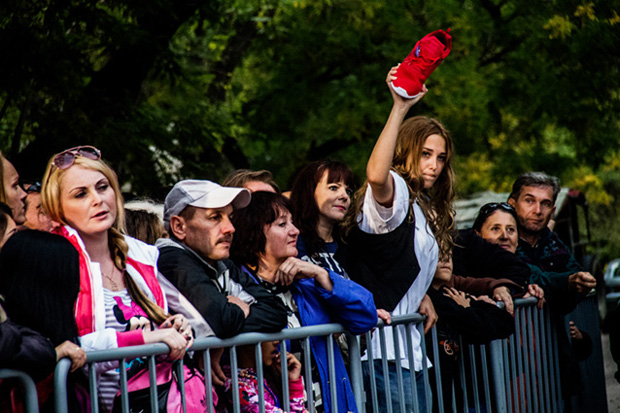
Adaptation of a novel «Paradise Found» written by Andrey Gelasimov . On the eve of his draft day a youngster Sasha nicknamed Jagger decides to spend the modest amount of money he has saved to buy stylish sneakers. By chance the sneakers take him to a girl named Amira, with whom he spends the night. In the morning it transpires that the girl has a nine-year-old son Mitia. The boy is autistic and suffers from some other mental illness. Amira asks Jagger and his friend to help her take the boy to the orphanage.
SERGEY SOLOVIEV (25.08.1944, Kem, USSR) graduated from the department of directing at VGIK (1969, class of A.Stolper). Debuted as a director in 1969 shooting two novellas for the film almanac “Family Happiness”. In 1971 directed his first feature “Yegor Bulychev and Others”. Winner of numerous national and international awards. His best and most well-known works like “One Hundred Days After Childhood” (1975), “The Lifeguard” (1980), “Wild Pigeon” (1986), “Assa” (1987), “Tender Age” (2000) are part of the “Golden Fund” of Soviet and Russian cinema. Among the director’s latest works are “Classmates” (2010), “Anna Karenina” (2011) and “2-Assa-2” (2011). From 1995 to 1997 he was President of the Moscow Film Festival. Since 1985 has been teaching film directing at VGIK. He is the founder and President of the International Festival of Film Debuts in Khanty-Mansiisk “Spirit of Fire”.
CLOSING FILM
CAFÉ SOCIETY
Director Woody Allen
USA
2016 96’
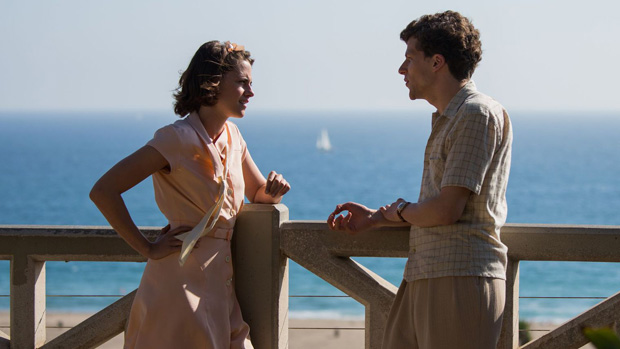
New York in the 1930s. As he has more and more trouble putting up with his bickering parents, his gangster brother and the family jewelry store, Bobby Dorfman feels like he needs a change of scenery! So he decides to go and try his luck in Hollywood where his high-powered agent uncle Phil hires him as an errand boy. In Hollywood he soon falls in love but unfortunately the girl has a boyfriend. Bobby settles for friendship – up until the day the girl knocks at his door, telling him her boyfriend just broke up with her. All of a sudden Bobby’s life takes a new turn, and a very romantic one at that.
Woody Allen (1.12.1935, New York) is an American actor, comedian, filmmaker, and playwright, whose career spans more than six decades. One of the most recognisible living filmakers and productive authors, Woody Allen has directed over 50 features since his 1966 debut WHAT'S UP, TIGER LILY?
FilmNation Entertainment
www.filmnation.com
www.volgafilm.ru
COMPETITION PROGRAM
37
Director Puk Grasten
Denmark, USA
2016, 85’
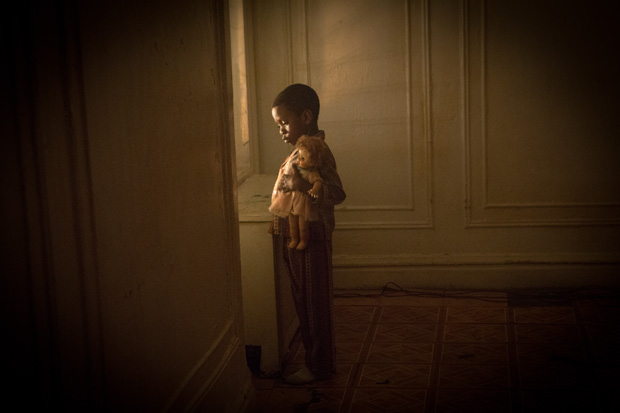
‘37’ is inspired by a true story set in 1964, New York, where several neighbors witness the brutal murder and rape of Kitty Genovese and do not intervene. The film peeks into the lives of three disparate families, the lonely neighbor and the doorman. We understand their decisions not to act by understanding their day-to-day struggles.
PUK GRASTEN (1986, Copenhagen) attended the European Film College in Denmark and moved to Paris soon after to pursue a BFA in film production at EICAR -The International Film School. In 2009 she enrolled at NYU Tisch Graduate Film Program as a thesis student. Her thesis film 37 (2016), Grasten's feature film debut, is based on her short film of the same name.
LA MACCHINAZIONE/THE PLOY
Director David Grieco
Italy, France
2016, 112’
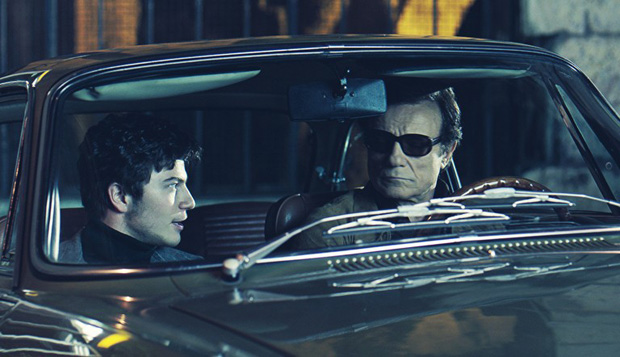
In the summer of ’75, Pier Paolo Pasolini is editing one of his most controversial movies “Salò”. At the same time he is writing a book, containing a brave condemnation of a corrupt political and financial power. In those same days Pasolini is seeing a young man from the working-class suburbs of Rome, Pino Pelosi. Pasolini and Pelosi meet regularly becoming the talk of the roman suburbs. In these same suburbs move shady characters that have little to do with Pasolini’s poetic view of life. When the negative of “Salò” is stolen from Technicolor’s laboratory, a mortal trap is set for the director. In the night between the first and the second of November 1975, Pier Paolo Pasolini drives to retrieve his film. Truly, and possibly even consciously, he is going straight into an ambush: many accomplices, some willing and some unaware, all alike and all equally guilty, have planned his murder in every minimum detail.
DAVID GRIECO (1951, Rome) started acting in movies at sixteen, at seventeen became an assistant director for Pasolini, Bertolucci and others. Worked as film and music critic and foreign correspondent, wrote a few books, directed commercials, hosted radio and television programs. He made more than 100 documentaries on film directors and movie stars. In 2004 he wrote, directed and produced his first feature film, EVILENKO which won 18 prizes all over the world. Recently, he has made a feature length documentary in Russia called THE FAKE FAIRY TALE.
EXCENTRYCY, CZYLI PO SLONECZNEJ STRONIE ULICY/THE ECCENTRICS. ON THE SUNNY SIDE OF THE STREET
Director Janusz Majewski
Poland
2015, 112’
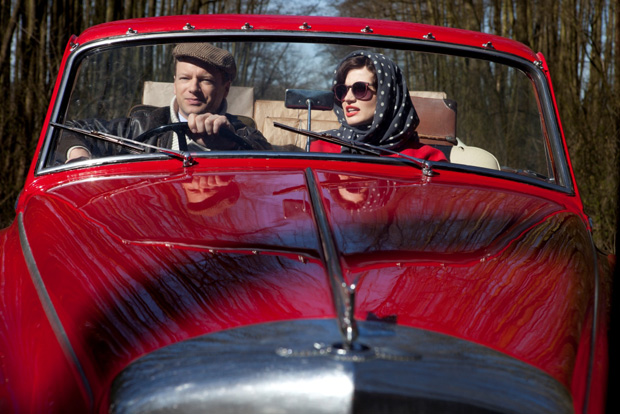
In the late 1950s Fabian, a war emigrant, jazz trombonist and brilliant dancer, returns from England to Poland. Together with a group of local eccentrics and amateur musicians he starts a swing band. After their first gig people’s interest with the band surpasses all expectations. Fabian meets and intriguing Modesta and asks her to perform with his orchestra. They soon become lovers. They are like two colorful birds against the dreary reality. Their looks and behavior arouse a longing for freedom and prosperity. However, one day Modetsa disappears.
JANUSZ MAJEWSKI (5.08.1931, Lwow, Poland) graduated from the department of architecture at the Kraków Technical University (1955) and directing at the ?ód? National Film, Television and Theatre School (1960). In 1961 he started to work at the documentary studio in Warsaw. From 1983 to 1990 he was Chairman of the Polish Union of Filmmakers. His feature film debut was the comedy THE LODGER (1966). His filmography includes AVATAR, OR EXCHANGE OF SOULS (1965), LOKIS (1970), JEALOUSY AND MEDICINE (1973), HOTEL PACIFIC (1975), THE GORGON CASE (1977), LESSON OF A DEAD LANGUAGE (1979), ZLOTO DEZERTERÓW (1998), MALA MATURA 1947. Prizewinner of numerous international film festivals.
MARIE ET LES NAUFRAGÉS/MARIE AND THE MISFITS
Director Sébastien Betbeder
France
2016, 104’
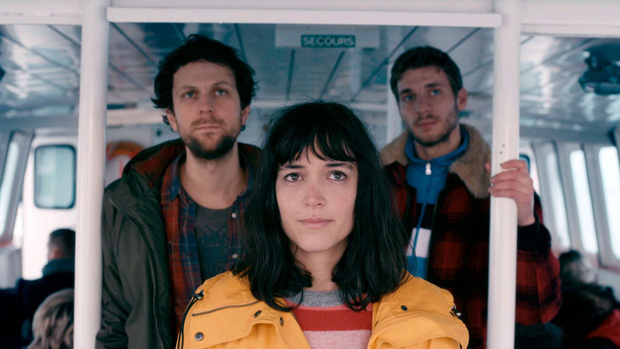
Marie is an alluring young woman who lacks self confidence. When she leaves Antoine – a melancholic writer, she meets with Simeon, a jobless journalist. Yet she prefers to let fate decide her future. Antoine and Simeon become obsessed by an elusive Marie. This is a story of desperate souls between Paris and an island in Brittany. It’s also a story about a story being written.
SÉBASTIEN BETBEDER (1975, Pau, France) Is currently based in Paris. After his studies at the Beaux Arts in Bordeaux, he completed his degree in Tourcoing at the Fresnoy. His first feature Nuage (2007) was screened in competition at Locarno. His filmography includes LES NUITS AVEC THÉODORE (2012), 2 AUTOMNES, 3 HIVERS (2013) and VOYAGE AU GROËNLAND (2016).
MONAKH I BES / THE MONK AND THE DEMON
Director Nikolai Dostal
Russia
2016, 114’
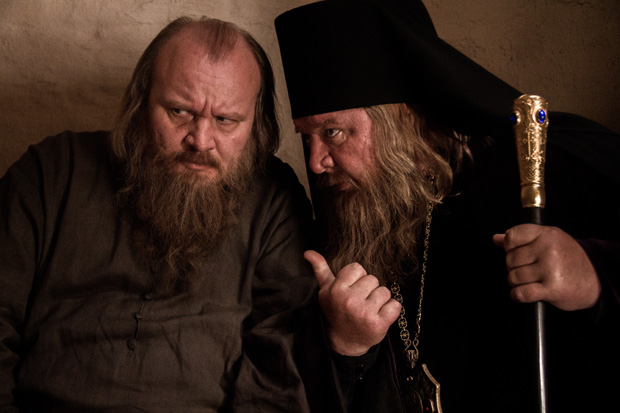
A new brother, Ivan Shaposhnikov, settles in the friary. But dark forces follow him into the monastery and from time to time they materialize as Legion (at least that is how he introduced himself to Ivan). Legion has chosen Ivan as the object of his devilish work, tempting him in every possible way in an attempt to make him abandon the chosen path of God. But the greater the temptations, the stronger Ivan’s spiritual powers grow…
NIKOLAY DOSTAL (21.5.1946, Moscow) graduated from the journalistic department of the Moscow University, and started working as a second-unit director on the Mosfilm Studios. In 1981 Dostal graduated from Georgi Danelia’s workshop of the Higher Courses for Directors and Scriptwriters, and one year later made his directorial debut with the film OZHIDAETSYA POKHOLODANIE I SNEG. International success came to Dostal with his fifth feature film, OBLAKO-RAY (1990), which has received many prizes both in Russia and worldwide. Among his other most famous directorial works are: A SMALL GIANT OF BIG SEX (1992), MELKIY BES (1995), KOLYA - PEREKATI POLE (2005), PETE ON THE WAY TO HEAVEN (2009, Golden George of the 31st MIFF and acclaimed TV-series: THE PENAL BATTALION (2004), ZAVESHCHANIE LENINA (2007) and RASKOL (2011).
DOKHTAR / THE DAUGHTER
Director Reza Mirkarimi
Iran
2016, 103’
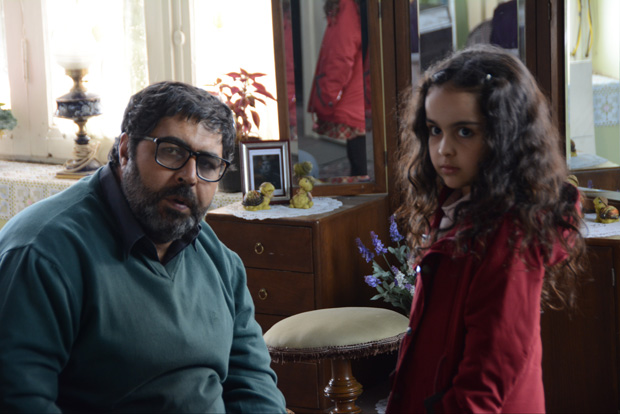
The strict and traditional Mr Azizi leads an uneventful family life in an oil town of southern Iran. Then one day, exasperated by her father's authoritarianism, Setareh announces she is off to Tehran to say farewell to one of her best friends who is leaving Iran for good. Unfortunately, the engagement celebrations of Setareh's younger sister are taking place simultaneously. Despite her father's objections Setareh takes the plane for Tehran. This act of disobedience sets in motion a series of perturbations that upset the calm tranquility of the paterfamilias.
REZA MIRKARIMI (27.1.1967, Tehran) graduated from the Fine Arts University in Graphic Arts. His cinema activities began in 1987 with a series of shorts followed by two TV series for young people. His 1999 first feature, THE CHILD AND THE SOLDIER, has won several national and international awards. His 2000 second feature UNDER THE MOONLIGHT (2001), dealing with social and religious issues, won the 40th Critics' Week Best Feature Award at the 2001 Cannes International Film Festival. A fifth feature, AS SIMPLE AS THAT, won the 2008 Golden St George Best Film Award at the Moscow IFF. Three of his films have been entered by Iran for the Best Foreign Language Film Oscar: SO CLOSE, SO FAR (2005), A CUBE OF SUGAR (2011) and TODAY (2014).
EL SONIDO DE LAS COSAS / THE SOUND OF THINGS
Director Ariel Escalante
Costa Rica
2016 77’

Claudia loves being a nurse. Handling adrenaline, controlling emotions, saving lives. At home everything is different: there’s a room to clear out, she needs to find a new roommate. Claudia is unable to deal with her cousin’s recent suicide, even though she is doing a great job of hiding it from people. But when an old acquaintance comes back to her life with an illness and in need of her support, she will be finally forced to confront the weight of loss.
ARIEL ESCALANTE (1984, San Jose, Costa Rica) studied Political Science at the University of Costa Rica and Film at the International School of Film and Television (EICTV) in Cuba. Two-time winner of Best Short at the Costa Rica International Film Festival (CRFIC), he also worked as an editor. In 2010 he was selected for a Creative Residence by Concordia University and the Bureau of International Education of Canada to start writing the script of “The Sound of Things”, his first film as a director. He is currently teaching Directing and Screenwriting at Costa Rica’s Film School.
QUASE MEMÓRIA / OBLIVIOUS MEMORY
Director Ruy Guerra
Brasil
2015 95’
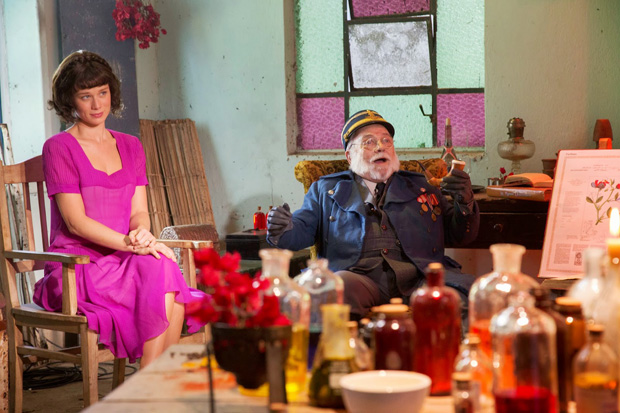
Carlos is a man afflicted by memory problems who meets himself in a time warp. Young Carlos faces old Carlos’ oblivion, who does not even remember his own face. They receive a package. But it looks strange. The knot tied around it, the smell, the writing on the envelope: the package could only have been sent by his father, Ernesto, who has been dead for years. A father who always engineered unexpected situations. In this time warp, one Carlos remembers and the other Carlos forgets their fun memories of this brilliantly mad father.
RUY GUERRA (22.8.1931, Mozambique) studied at IDHEC film school in Paris from 1952. In 1958 he started his career as an assistant director in several French films. Later on he immigrated to Brazil, where he directed his first feature film, THE HUSTLERS (1962). He has directed 14 features, won over 60 awards, with national classic THE GUNS (1964), A QUEDA (1976), ERÉNDIRA (1983), MALANDRO (1986) and TURBULENCE (2000). His PORTUGAL S.A. was shown in competition of the 26 MIFF.
OUT-OF-COMPETITION PROGRAMS
EUROPEAN EUPHORIA: BETWEEN HEAVEN AND HELL
The past year was a difficult one, but the worst trials befell Europe, such as it had not known since the Second World War. The old continent faced new reality and first of all the mammoth flow of immigrants. Gianfranco Rosi’s film “Fire at Sea” could have been called “The Sea Burns” by analogy to “La Terra Trema” by Luchino Visconti. It is along the southern borders of Italy and Greece that the line of tension stretches and the question remains: will Europe be able to withstand it. The Mediterranean - the cradle of civilization, its natural, cultural and gastronomic heaven – may turn into purgatory and hell.
Though, in the “Euphoria” there are no more movies tackling the migration crisis besides this famous film, which won the Berlinale award. The rest of the movies that we selected, describe how the most beautiful feelings and best intentions can lead to hell. How passion, sex, love for the dear ones and for one’s own ethnic community can at some point lead to violence, murder and war. This is the cinema of ruminations and temptations, traps and falls of European civilization, which has survived more than one “invasion of the barbarians” from without as well as from within.
Andrei Plakhov
THE TIME OF WOMEN
In the 21st century in the film industry sexism is becoming a thing of the past. Each year more and more women leave their mark as filmmakers, world film festivals seek out works by female directors for their programs. Women’s cinema is a world phenomenon, a subject of critical and scientific studies, a media topic. Women in Europe and Asia, USA and Russia have not as yet attained dominant positions in the mainstream, but they have firmly secured a place for themselves in art films, art house cinema and art mainstream, so probably in a short time we will be watching various “female blockbusters”. In any case American women filmmakers are actively discussing it on the Internet.
The strengthening of women’s positions in various film professions including film directing has been brought about not merely by various stages in the feminist movement in various countries or the conscious gender-oriented cultural policy in a number of states, but also by the women’s amazing ability to quickly learn and become professional. It is no accident that statistical data for many Western countries indicates that the number of women with higher education and PhDs exceeds the corresponding figures for men. Women are actively setting up their organizations and institutions, promote films at festivals and in other forms of distribution. They may resort to media uproars, blowing up the situation and achieving their goals. We still vividly remember the uproar at the 2012 Cannes Film Festival when women got together and promptly put forward the demand that the leading festival should select their works for competition. This year’s programs of such festivals as the Sundance, Rotterdam, Gothenburg, Berlinale, Cannes provide the evidence that their selectors have advanced in the study of Women’s Cinema.
Films by women directors introduce new sentimentality, construct different subjects and objects of scrutiny in the rapidly changing social milieu, which do not resemble those of the male-dominated cinema of the 20th century. Women force us to take a different look at women and men on the screen; instead of mythologizing and poeticizing the reality or the subject, they adopt a critical and stereoscopic approach. Women love nuances and details which often add together to form a stereoscopic image of the subject. They seem to keep in mind that cinema is not merely entertainment, performance or a philosophical and political message, it is also the study of a human being and his milieu, an instrument if psychological and social therapy. Films by women directors which often tackle family problems and offer in-depth studies of sexuality, seem to remind us about humanism at the time of the triumph of post-humanism and in so doing permit to preserve the balance in our understanding of man, society, the world. Women’s Cinema does not so much advocate an imperial approach to society in which they live and work, but rather it promotes a multitude of cosmopolitan views creating a common dream about an open society without hard and fast borders which opposes violence as well as vertical power structures. At the time of global media and transnational cinema this qualitative approach is absolutely logical because it naturally follows from their inherent idea of an open society.
For the second year running the Moscow International Film Festival includes films by women directors as a separate program, thus showing support for the success of women in world cinema. This year’s program is called “The Time of Women” which resonates with the evident gender changes in world cinema and in our country, where female directors are – sadly – not as yet so well institutionalized as they are in, say, the USA with the actively functioning organizations like “Film Fatales”, “Alliance of Women Directors”, “Women in Film” and others, but nevertheless they are making themselves heard. The program “The Time of Women” stresses the US experience and includes several movies from that country with the aim of showing how in a country of post-feminism the skills of self-organizing and cooperating with each other, of using new media to promote one’s work lead to growing professionalism and give a chance to go on working in the global and very competitive world of contemporary media and film. The experience of American ladies who have long ago managed to turn the festivals in Sundance, New York, Tribeca, Seattle their favorite venues for premiere screenings as well as for women directors from other countries can be very useful for our female filmmakers who are so far represented mostly at “Kinotavr”, as well as for the Russian viewers eager to learn about new tendencies in world cinema. The program “The Time of Women” is the time to watch movies in a new way.
Anzhelika Artyukh , curator of the program
MISSING PICTURES
Not all movies are readily accessible. Some of them are fairly good. So much so that like Ciderellas they fade from the view of princes-selectors even before the end of the festival ball. Some films are more equal than others. Some are missed and forgotten for weighty reasons. Others are very hard to forget even for such a cynical and world-weary viewer as myself. I can assure you, it is not for nothing that I remember them one or two years after the festival premiere. At least it means that these films have not become obsolete, have lost none of their provocative power and artistic importance.I personally consider them true pearls that no one found. It is not that they were left to lie listlessly on the bottom. For a number of subjective and objective reasons they did not make it into commercial or festival distribution in this country.Looking for pearls overlooked by others is a pleasure in itself. There are enough small and big pearls to fill all festival days. They come from the Forum in Berlin, from “Venetian Days”, from the “Directors’ Fortnight” and “Un Certain Regard” in the Cannes as well as from the main competition of these and other festivals. There will be no ballast in the programme. That is for sure. Which does not mean that you are going to like every picture. What I can promise you is that every viewing experience will be unique. And if you do (not) like today’s movie, it does not mean that you will (not) like tomorrow’s one. Simply because it will be a totally different film.
Stas Tyrkin, Curator of the programme
SEX
FOOD
CULTURE
DEATH
In the name of the program SEX (which is an abbreviation of four Russian words for Sex, Food, Culture and Death) the last constituent has been logically changed from “glory” to “death”. The resurrected series continues the culturological studies of most talked-about and extreme works of documentary and live-action cinema ranging from films intended for the popular audience to the exclusive and unique works.
Sexuality is best of all represented by Mediterranean culture: the Italian political parable “Porno and Liberty” starring the porn actress and a member of Parliament Cicciolina and a movie about the ballet by the master of Italian cinema Davide Ferrario “Sexxx”.
The Japanese film “Miso Soup for Hana” transplants the viewer into a totally different cultural context. National cuisine (as well as transnational love affairs) turns out to be something more than a form of ascertaining one’s own uniqueness. It is a most important tool of cultural interaction – and not merely culinary.
Armenian culture of the crucial period following the disintegration of the Soviet Union is revealed in its controversial entirety in David Safaryan’s “Hot Country, Cold Winter”. The director has worked at this movie for almost a quarter of a century. Its title (cold winter), its tragic epic scale (albeit more modest), remind one of the famous series “Game of Thrones”. The quest for the epic scale of a series is carried on by the eight-hour-long film by the Filipino Lav Diaz “Lullaby to the Sorrowful Mysteries”, which was screened at the Berlinale. It brings us to the discussion of death as the main topic of this year’s program “SEX”.
In this film the plot revolves around the search for the body of Andreas Bonifacio, while in Pablo Agüero’s “Eva doesn’t Sleep” starring Gael García Bernal and Denis Lavant we follow the misadventures of the embalmed body of Eva Peron, the leader of the Argentinian people, the once legendary Evita.
DISCOVERY: CINEMA OF THE TURBULENT ARAB EAST
The program introduces our viewers to a whole new world. Today the Arab World is the focal point of conflicts (many of them bloody) and contradictions threatening the stability on our planet. Mass media regularly covers various aspects of the crisis situation. But what does real life look like from within? Festival viewers will learn about it from the films of recent years created in various countries of the Middle East and Maghreb occasionally with the participation of former colonisers – West European countries.
One tangle of contradictions is related to the Israeli-Palestinian adversity. The Arab family from “Attack” and the inmates of the prison for female offenders from “3000 Women” are all drawn into the conflict.
The young protagonist of the award-winning “The Wolf” (Jordan) once again draws attention to the story of the colonisation of Bedouins, while ten-year-old Noyom is trying to obtain a divorce from her hated husband (“I am Noyom, I Am 10 and I Am Divorced”, Yemen).
The Syrian “Skin” displays an unexpected post-modernist approach to the tribulations of young refugees.
Those are but several disparate examples of the fruitful and sometimes contradictory development of film art in a situation when personal problems are inseparable from the economic, ethnic and political issues.
8 ½ FILMS
“Eight And a Half Films” is one of the oldest and most popular programs of the Moscow Film Festival. For the first time it appeared in 1999. Over the years it offered Russian premiers of works by such outstanding masters of cinema as Bernardo Bertolucci, Chen Kaige, Tsai Ming-liang, Bruno Dumont, Leos Carax, Spike Jonze, Nagisa Oshima, Todd Haynes, Andrzej Wajda, Lukas Moodysson, Mohsen Makhmalbaf, Alexandr Sokurov, Denys Arcand, Abdelatif Kechiche, Ruben Östlund, Robert Altman, Mike Figgis, Lucian Pintilie, Marina Abramovich, Matthew Barney, Larry Clark, Richard Prince, Sam Taylor-Wood, Gaspar Noé, Peter Greenaway, Samira Makhmalbaf, Claude Lelouch, Olivier Assayas, Wim Wenders, Jia Zhangke, Alex van Warmerdam, Julien Temple, Youssef Chahine, Jean-Luc Godard, Amos Gitai, Michael Moore, Philippe Garrel, Guy Maddin, Jonathan Caouette, Jacques Audiard, Mike Leigh, Kira Muratova, Gus Van Sant, Lone Scherfig, Shohei Imamura, Ken Loach, Xavier Beauvois, Paolo Sorrentino, Danis Tanovi?, Idrissa Ouédraogo, Alejandro González Iñárritu, Mira Nair, Sean Penn, Jacques Perrin.
Among those who presented their own works screened in the program “Eight And a Half Films” were Jean-Pierre and Luc Dardenne, Michael Glawogger, Robert Guédiguian, Ulrich Seidl, Amos Kollek and Anna Thompson, Claire Denis, Mikhail Aldashin, Vassily Sigarev, Vladimir Khotinenko, Artur Aristakisian, István Szabó, Nuri Bilge Ceylan and other actors and directors. The unique author and curator of the program is the film critic, director, MIFF Head of communication Pyotr Shepotinnik.
MY ADDRESS IS MOSCOW
The program “My Address Is Moscow ” is devoted to cinematic addresses in Moscow.
In Moscow cinema often goes out into the streets and leaves behind visible and invisible marks, which are later sought out by enthusiasts and scholars who compile detailed guides to the cinematic capital, specifying spots of sudden encounters, desecrated love, lost and found wealth, mortal dangers and heroic deeds, in short everything that is found in abundance in the best moments in movies.
Every address in the city is a potential movie, many as yet unfilmed stories are hiding behind stone facades, in the bystreets and squares. Resilient melodrama, manifesting itself in the mannerisms of “The Victim of the Tverskoi Boulevard” or in the poignant “Three Poplars in the Plyuschikha Street”, is followed by detective thrillers which move from “Petrovka 38” to “Ogaryova 6”. Next come nostalgic chronicles of the old Arbat and the Pokrov Gates.
The frighteningly multifaceted Moscow finds an appropriate genre, story and characters for each address.
Nina Boyarshinova
27.05.2016 | Bilal's blog Cat. : FILM
|
LinksThe Bulletin Board > The Bulletin Board Blog Following News Interview with EFM (Berlin) Director
Interview with IFTA Chairman (AFM)
Interview with Cannes Marche du Film Director
Filmfestivals.com dailies live coverage from > Live from India
Useful links for the indies: > Big files transfer
+ SUBSCRIBE to the weekly Newsletter Deals+ Special offers and discounts from filmfestivals.com Selected fun offers
> Bonus Casino
User imagesAbout Bilal JAMAL Ayman JAMAL Ayman (Barajoun Entertainment) Facebook View my profile Send me a message The EditorUser contributions |


















